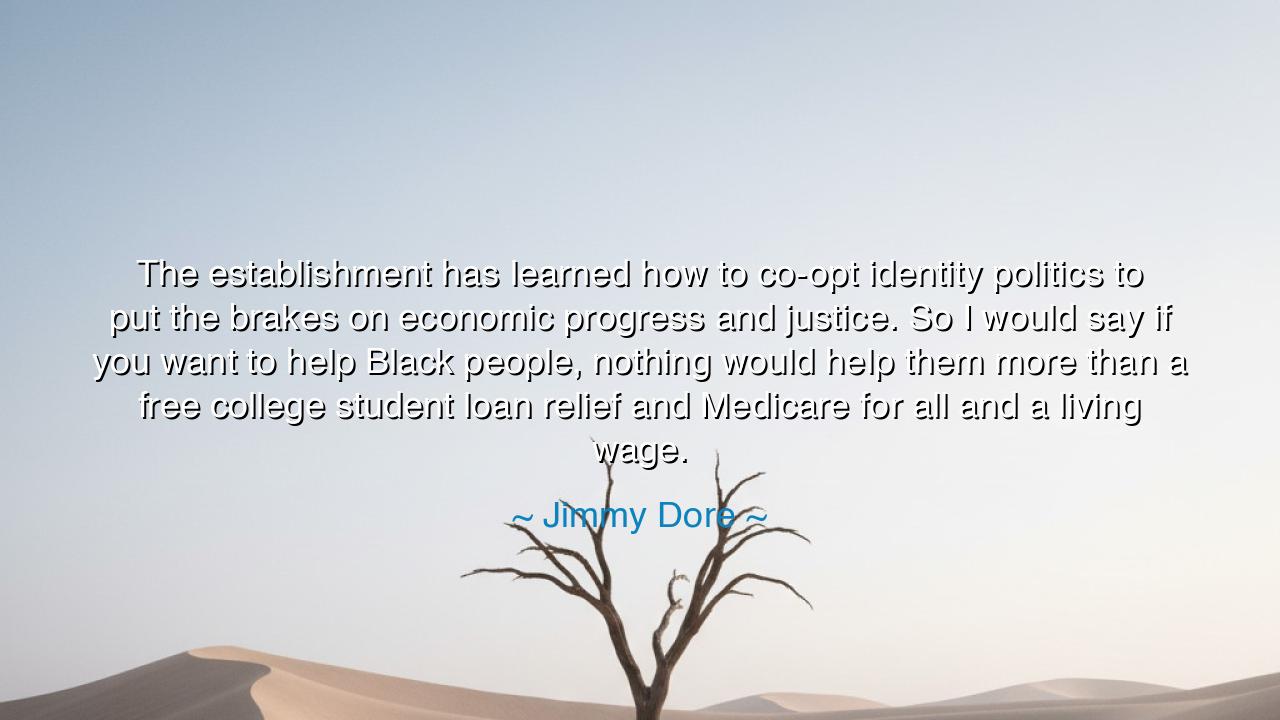
The establishment has learned how to co-opt identity politics to
The establishment has learned how to co-opt identity politics to put the brakes on economic progress and justice. So I would say if you want to help Black people, nothing would help them more than a free college student loan relief and Medicare for all and a living wage.






The words of Jimmy Dore, “The establishment has learned how to co-opt identity politics to put the brakes on economic progress and justice. So I would say if you want to help Black people, nothing would help them more than a free college student loan relief and Medicare for all and a living wage,” sound like a trumpet against deception. He warns that those in power use identity politics not as a shield for the oppressed, but as a weapon to distract and divide, so that the deeper struggles—poverty, debt, sickness, and the cry for justice—remain unresolved. His words call us back to the root of service: real policies that lift the burdens of daily life.
The ancients knew this danger well. In Rome, emperors would throw bread and circuses to the masses, offering entertainment to quiet their anger while ignoring the deeper need for justice and reform. They offered tokens of attention, but withheld true change. So too, Dore speaks of a modern empire where the establishment employs symbols and slogans while keeping the people chained by debt, by hunger, and by want. Symbols without substance are chains gilded in gold.
History offers powerful testimony. Consider the civil rights movement in America. Leaders like Martin Luther King, Jr. spoke not only of racial equality, but also of economic justice, demanding fair wages, housing, and healthcare. King warned that without tackling poverty, freedom would be hollow. Yet after his death, much of his vision was narrowed to identity alone, while the greater struggle for economic liberation remained unfinished. Dore’s words echo King’s own: real freedom is found not only in dignity, but in bread, education, and health.
His call also reveals the eternal struggle between appearance and substance. To honor one’s identity is noble, but when rulers elevate symbols while denying food, medicine, and education, they betray both the spirit and the body of the people. Relief from crushing student debt, access to healthcare, and a living wage—these are the stones upon which true liberty is built. Without them, the house of equality stands on sand.
Let the generations remember: rulers may offer words, but justice demands deeds. Beware those who speak of unity while keeping chains upon the people. True service is measured not in gestures, but in lifting burdens. And if we would help the oppressed, we must do more than honor their name—we must secure their bread, their knowledge, their health, and their dignity. For only then does justice walk among us, not as an idea, but as living truth.






ATPhat An Thinh
While I see the logic in this quote, I also feel that it might oversimplify things. Economic policies like student loan relief and a living wage are important, but do they address the roots of racial inequality and discrimination in a society that is still structurally biased? How do we reconcile the need for economic reforms with the ongoing struggles for racial equality and representation? Is one more urgent than the other?
CADinh Pham Chau Anh
This quote is really provocative, especially in the context of today’s political climate. Is Dore suggesting that identity politics is being manipulated to stop progress on real economic justice? I wonder if this analysis overlooks the fact that issues like racial inequality aren’t just about economics—they also involve power, privilege, and cultural shifts. Can you really fix racial injustice without addressing both economic and identity-based concerns?
TVBui thi van
Jimmy Dore’s point about free college, Medicare for all, and a living wage seems to suggest that real, substantive change comes from economic reform rather than symbolic gestures. But can we ignore the reality that identity politics often highlights struggles that are deeply tied to economic inequality? If we focus only on economics, could we risk overlooking the specific needs and injustices faced by certain groups? How do we balance the two?
DApham duc anh
It’s hard to ignore the truth in this quote—economic justice could make a huge difference for many communities, especially Black people. But I also think there’s a deeper issue at play: how do we actually implement these changes in a way that benefits everyone, not just the wealthy? Is it possible that identity politics and economic justice can work hand in hand, or is the system just designed to pit them against each other?
NNTran Ngoc Nam
I get the frustration in this quote, but I’m not sure I agree entirely. While economic policies like student loan relief and Medicare for all are important, isn’t the issue of identity and systemic racism still crucial to address? Can you really separate the fight for justice on a racial level from economic justice? Wouldn’t the economic reforms alone leave behind a lot of the deeper societal issues that need fixing?